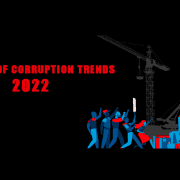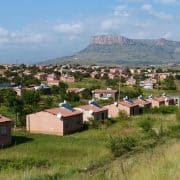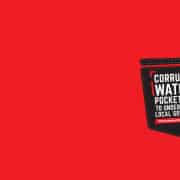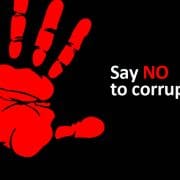|
Getting your Trinity Audio player ready...
|
By Melusi Ncala
First published on News24
In the past year, South Africans have endured not only the hardships of Covid-19 on top of everything else, but have been subjected to the outlandish and improbable promises of campaigning politicians gearing up for the local government elections. When casting our vote, writes Corruption Watch’s Melusi Ncala, we must keep in mind that their promises were many and their deliveries were few.
A question that I occasionally receive from members of the public, social justice comrades and media colleagues is whether, based on the number of corruption cases that Corruption Watch gets, we can say how dire the situation is in South Africa? My supposition is that the answer is usually either academic or political or both.
Truly speaking, and this ties in with the former, wrongdoing in this respect is immeasurable. Hence, society relies principally on perceptions when talking about this headache. Meanwhile, in terms of politics, we are tragically entertained by grandiose accounts of elite corruption. When we hear these stories, our blood boils at the jaw-dropping amounts of cash that politicians and businesspeople pocket.
Nevertheless, whether the scholarly or politically driven attempts to understand the extent of impropriety in the country, do the answers to this inquiry tell us about the impact of bribery, sextortion, nepotism, procurement irregularities, and embezzlement have on all our lives individually and as a collective?
When Corruption Watch receives a report of corruption, it should rather be understood that this is likely an account of a woman who is a breadwinner to a family of several generational members living under the same roof, if they are that fortunate. Similarly, another case should be viewed as a civil servant’s complaint about theft of resources affecting not only office morale but possibly also a community of tens of thousands of people who simply will not be provided essential services.
This has been my realisation in the years of data analysis and engagement with whistle-blowers in several communities throughout South Africa. More recently, this view was substantiated by over 5 000 whistle-blower accounts that document the trail of destruction left by acts of criminality and corruption at the local level of government.
Our report on corruption in this regard highlights how wrongdoers are mainly operating in the offices of the municipal managers, the local police, and state-sponsored housing sectors. Overwhelmingly, bribery, extortion, and employment and procurement corruption cases depict how funds were selfishly squandered, and ordinary persons were left forsaken in almost every metropolitan, local and district municipality. With municipal elections taking place in just a few days, we, the people, have another opportunity to change this.
We dare not forget about the promises made by politicians and administrators not only in previous elections but in the forthcoming one too. Not that the electorate could have imagined that circumstances could be gloomier considering the high levels of violence, landlessness and unemployment we find ourselves struggling with, but alas, the last five years are probably some of the most difficult experienced by South Africans from all walks of life under democratic rule.
During this past period, those entrusted with power should hang their heads in shame because they are the crop of so-called leaders who shouted the loudest that they would effect transparency, accountability, good governance, and ultimately a corrupt-free South Africa. Yet, as evidenced by the Auditor General of South Africa’s reports on local government, including tens of thousands of whistle-blower cases gathered over the years, qualified audits have become the norm and we have accepted empty ‘ag shames’ in our daily conversations in which we unhealthily compare people’s widespread inequality and beggary. Meanwhile, the horrors caused by greed and self-enrichment are allowed to mount, and some in society have the audacity to call for patience while this evil does not cease even during a global crisis. On the contrary, it has arguably intensified.
Devil is in the detail
That said, it is business as usual. Political parties and shady characters launched their sixth voter campaigns with comedic pop culture references of how the gates to service delivery will be opened, gimmicky slogans on land restitution, and tactless ‘wait a minute’ monologues where the long-term abusive partner begs for one more chance.
But, as the adage goes, the devil is in the detail. Unsurprisingly, those vying for council positions either fall short on the specifics in combating corruption, or their hypocrisy is simply no longer inspiring. However, that devil is ever-present and very bold. We need not look too far or wide, for we know of the public health funds that have been misappropriated and stolen. We know of the Covid relief food parcels that miraculously were given to councillors’ friends and families instead of the elderly who are caregivers to parentless children. We know that sextortion will guarantee good school marks and that a solicited bribe will protect drug dealers and instil fear in community members.
If the impulse is to quantify corruption, do so by taking stock of its effects. The stark reality of destituteness for millions gives an account of an ailing nation in the clutches of unethical political heads and equally dishonest businesspeople. Unfortunately, this is indicative of a leadership vacuum in society, an absence of high-minded leaders.
In the alternative, the righteous have no claim to power and people. Their responsibility is to serve the downtrodden with humility, bravery and integrity. Were they worthy of the name, those referred to as leaders would, among other social virtues,
- gracefully acknowledge evidenced alleged improper conduct;
- fiercely and openly address malfeasance affecting the little person and;
- strive, at all times, to be beyond reproach, especially in relation to their dealings and money handling.








